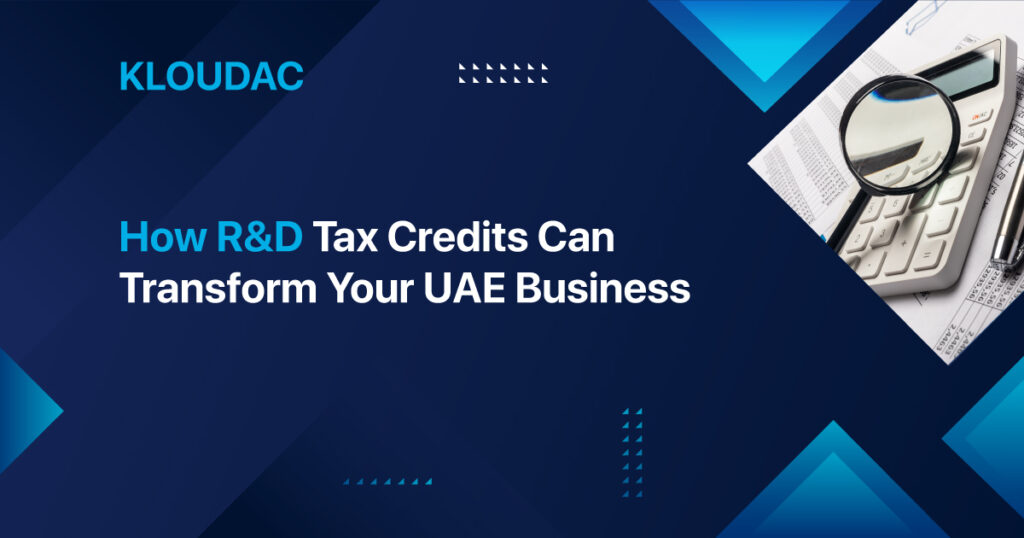The UAE is launching refundable Research and Development (R&D) tax credits starting from the 2026 tax year, and businesses can get back 30-50% of their local R&D spending. This incentive is a game-changer for startups, tech firms, and SMEs looking to scale by investing in innovation.
1. Why the UAE Is Offering R&D Tax Credits
- Aims to stimulate innovation-driven growth aligned with global economic strategies
- Mirrors successful R&D incentives in countries like Ireland and Singapore
2. Who Can Benefit?
The UAE has adopted a broad definition of R&D for tax credit eligibility. Great news for both established businesses and startups. You don’t need to be a deep-tech company to qualify. If your work involves innovation, technical experimentation, or solving uncertainties, your business may be eligible.
Sectors Likely to Qualify:
- Fintech & Insurtech: For instance, businesses can focus on building fraud detection systems, payment gateways, or digital ID verification tools.
- Manufacturing: For example, businesses can focus on developing new materials, automation techniques, or eco-friendly production methods.
- Pharmaceuticals & Biotech: Running clinical trials, formulating new drugs, or improving delivery systems
- Agritech: Innovating in soil health, water efficiency, or controlled-environment farming
- Clean & Renewable Energy: Designing solar, hydrogen, or carbon-capture technologies
- AI & Robotics: Training machine learning models, testing autonomous systems, or creating predictive algorithms
- Software & SaaS: Building scalable platforms, experimenting with architecture, or launching innovative user interfaces
Eligible Business Types:
- Mainland or free zone companies, as long as the R&D is physically conducted in the UAE
- SMEs, corporates, and tech startups working on process improvements, new prototypes, or product development
- Public and private entities investing in knowledge creation, experimentation, or novel applications
If your project involves solving technical problems with no known solution, it may qualify under the OECD Frascati standards for R&D.
3. What Expenses Qualify?
- Salaries of staff directly working on R&D
- Materials & equipment used in projects
- Outsourced research conducted within the UAE
- Lab/cloud costs and supporting overheads
4. How Much Can You Claim
- 30–50% refundable credit, based on company size and qualifying investment
- Fully refundable, even if your business has zero taxable income
5. When It Starts & How to Prepare
- First Announced by the UAE Ministry Of Finance (MOF) in December 2024
- Begins for financial years starting 1 January 2026
- First claims: Likely in 2027 based on 2026 tax filings
- Now is the time to prepare:
- Set up R&D expense tracking
- Document projects and technical objectives
- Train the team to log involvement accurately
- Set up R&D expense tracking
6. How to Claim
- Register each R&D project and expense as defined by OECD Frascati standards
- File your claim through the FTA’s EmaraTax portal alongside the corporate tax return
- Keep detailed records for 7 years to support audits
FAQ: Common Questions
Q: Does a company need to be profitable?
A: No, claims are refundable. Even loss-making businesses receive cash credits.
Q: What if R&D work is outsourced abroad?
A: Only UAE-based R&D activities qualify for the tax credit.
Q: Can free zone companies benefit?
A: Indeed, with a 0% tax rate plus refundable credits, businesses can enhance cash flow potential..
Prepare Now, Claim Later
Looking ahead to 2025, the prep year, businesses should first review accounting systems, then document all R&D activity, and finally ensure teams are trained to log project involvement accurately.
KLOUDAC can support your preparation by identifying eligible R&D costs, aligning your records with OECD standards, and setting you up for a smooth claim process in 2026.
